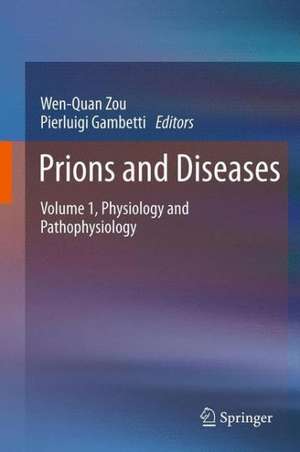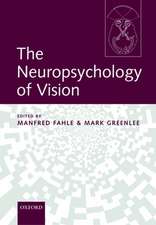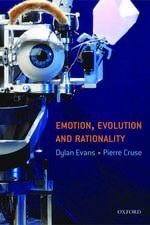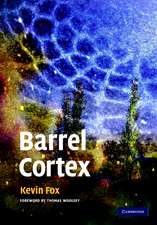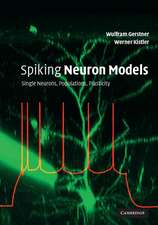Prions and Diseases: Volume 1, Physiology and Pathophysiology
Editat de Wen-Quan Zou, Pierluigi Gambettien Limba Engleză Hardback – 12 noi 2012
| Toate formatele și edițiile | Preț | Express |
|---|---|---|
| Paperback (3) | 942.44 lei 6-8 săpt. | |
| Springer – 12 dec 2014 | 942.44 lei 6-8 săpt. | |
| Springer International Publishing – 3 ian 2024 | 1407.99 lei 6-8 săpt. | |
| Springer – 13 dec 2014 | 1800.95 lei 6-8 săpt. | |
| Hardback (3) | 946.55 lei 6-8 săpt. | |
| Springer – 12 noi 2012 | 946.55 lei 6-8 săpt. | |
| Springer International Publishing – 2 ian 2023 | 1413.31 lei 6-8 săpt. | |
| Springer – 8 noi 2012 | 1839.60 lei 6-8 săpt. |
Preț: 946.55 lei
Preț vechi: 1154.34 lei
-18% Nou
Puncte Express: 1420
Preț estimativ în valută:
181.15€ • 187.13$ • 150.76£
181.15€ • 187.13$ • 150.76£
Carte tipărită la comandă
Livrare economică 25 martie-08 aprilie
Preluare comenzi: 021 569.72.76
Specificații
ISBN-13: 9781461453048
ISBN-10: 1461453046
Pagini: 252
Ilustrații: X, 242 p.
Dimensiuni: 155 x 235 x 18 mm
Greutate: 0.48 kg
Ediția:2013
Editura: Springer
Colecția Springer
Locul publicării:New York, NY, United States
ISBN-10: 1461453046
Pagini: 252
Ilustrații: X, 242 p.
Dimensiuni: 155 x 235 x 18 mm
Greutate: 0.48 kg
Ediția:2013
Editura: Springer
Colecția Springer
Locul publicării:New York, NY, United States
Public țintă
ResearchCuprins
Chapter 1 Transmissible Spongiform Encephalopathy: from the High Middle Ages to Daniel Carlton Gajdusek
Paul Brown
Chapter 2 The Rich Chemistry of the Copper and Zinc Sites in Cellular Prion Protein
Glenn L. Millhauser
Chapter 3 Role of Cellular Prion Protein in the Amyloid-ß Oligomer Pathophysiology of Alzheimer’s Disease
Adam C. Kaufman, Stephen M. Strittmatter
Chapter 4 Cellular Prion Protein and Cancers
Wei Xin, Man-sun Sy, Chaoyang Li
Chapter 5 Insoluble Cellular Prion Protein
Wen-Quan Zou
Chapter 6 Protein Misfolding Cyclic Amplification
Fabio Moda, Sandra Pritzkow, Claudio Soto
Chapter 7 Cofactor Involvement in Prion Propagation
Surachai Supattapone, Michael B. Miller
Chapter 8 Prion Protein Conversion and Lipids
Jiyan Ma
Chapter 9 New Perspectives on Prion Conversion: Introducing a Mechanism of Deformed Templating
Ilia V. Baskakov
Chapter 10 Infectious and Pathogenic Forms of Prion Protein
Emiliano Biasini, David A. Harris
Chapter 11 Cellular Mechanisms of Propagation and Clearance
Hermann M. Schatzl
Chapter 12 Molecular Mechanisms Encoding Quantitative and Qualitative Traits of Prion Strains
Jiri G. Safar
Chapter 13 Modeling the Cell Biology of Prions
Richard Rubenstein, Robert B. Petersen
Chapter 14 Prion Strain Interference
Charles R. Schutt, Ronald A. Shikiya, Jason C. Bartz
Chapter 15 Introduction to Yeast and Fungal Prions
Reed B. Wickner
Chapter 16 Yeast Prions are Pathogenic, in-register Parallel Amyloids
Reed B. Wickner, Herman K. Edskes, David A. Bateman, Amy C. Kelly, Anton Gorkovskiy
Paul Brown
Chapter 2 The Rich Chemistry of the Copper and Zinc Sites in Cellular Prion Protein
Glenn L. Millhauser
Chapter 3 Role of Cellular Prion Protein in the Amyloid-ß Oligomer Pathophysiology of Alzheimer’s Disease
Adam C. Kaufman, Stephen M. Strittmatter
Chapter 4 Cellular Prion Protein and Cancers
Wei Xin, Man-sun Sy, Chaoyang Li
Chapter 5 Insoluble Cellular Prion Protein
Wen-Quan Zou
Chapter 6 Protein Misfolding Cyclic Amplification
Fabio Moda, Sandra Pritzkow, Claudio Soto
Chapter 7 Cofactor Involvement in Prion Propagation
Surachai Supattapone, Michael B. Miller
Chapter 8 Prion Protein Conversion and Lipids
Jiyan Ma
Chapter 9 New Perspectives on Prion Conversion: Introducing a Mechanism of Deformed Templating
Ilia V. Baskakov
Chapter 10 Infectious and Pathogenic Forms of Prion Protein
Emiliano Biasini, David A. Harris
Chapter 11 Cellular Mechanisms of Propagation and Clearance
Hermann M. Schatzl
Chapter 12 Molecular Mechanisms Encoding Quantitative and Qualitative Traits of Prion Strains
Jiri G. Safar
Chapter 13 Modeling the Cell Biology of Prions
Richard Rubenstein, Robert B. Petersen
Chapter 14 Prion Strain Interference
Charles R. Schutt, Ronald A. Shikiya, Jason C. Bartz
Chapter 15 Introduction to Yeast and Fungal Prions
Reed B. Wickner
Chapter 16 Yeast Prions are Pathogenic, in-register Parallel Amyloids
Reed B. Wickner, Herman K. Edskes, David A. Bateman, Amy C. Kelly, Anton Gorkovskiy
Textul de pe ultima copertă
Transmissible spongiform encephalopathies (TSE), now broadly known as prion diseases, have been recognized for nearly 300 years in animals and almost 100 years in humans. However, the nature of the transmissible agent had largely remained a mystery until Stanley Prusiner discovered the infectious isoform of the prion protein (PrP), named prion or scrapie PrP (PrPSc), in 1982. The subsequent modern studies with protein chemistry and molecular biology in cell culture, transgenic animals, and cell-free systems, including the revolutionary protein-misfolding cyclic amplification (PMCA), have greatly advanced our understanding of the pathogenesis of prion diseases and facilitated the identification of new prion diseases in animals and humans. In Prions and Prion Diseases, more than 60 leading researchers and clinicians worldwide provide an up-to-date development in many aspects of these unique infectious pathogens and their associated diseases.
Volume I highlights the association of the cellular prion protein (PrPC) with copper and zinc, the potential roles of PrPC in Alzheimer’s disease and cancers, insoluble PrPC, PMCA, molecular and cellular mechanisms of PrPSc formation and clearance, possible co-factors involved in the conversion of PrPC into PrPSc, infectious and pathogenic forms of PrP, cell biology of prions, prion strains and their interference, as well as yeast prions and their inheritable and structural traits. This unique volume covers history from the high Middle Ages to the TSE era of Daniel Carleton Gajdusek, followed by the prion era of Stanley Prusiner whose extraordinary discovery opened a new chapter in prion research. Volume I will take you through the fascinating chronicle of prions in mammals, yeast, and fungi.
Volume I highlights the association of the cellular prion protein (PrPC) with copper and zinc, the potential roles of PrPC in Alzheimer’s disease and cancers, insoluble PrPC, PMCA, molecular and cellular mechanisms of PrPSc formation and clearance, possible co-factors involved in the conversion of PrPC into PrPSc, infectious and pathogenic forms of PrP, cell biology of prions, prion strains and their interference, as well as yeast prions and their inheritable and structural traits. This unique volume covers history from the high Middle Ages to the TSE era of Daniel Carleton Gajdusek, followed by the prion era of Stanley Prusiner whose extraordinary discovery opened a new chapter in prion research. Volume I will take you through the fascinating chronicle of prions in mammals, yeast, and fungi.
Caracteristici
Authored by a team of leading researchers and clinicians
Updated knowledge and concepts on pathogenic prion proteins and prion diseases
Present state-of the art findings and hypotheses beyond prions and prion diseases
Includes supplementary material: sn.pub/extras
Updated knowledge and concepts on pathogenic prion proteins and prion diseases
Present state-of the art findings and hypotheses beyond prions and prion diseases
Includes supplementary material: sn.pub/extras
Notă biografică
Wen-Quan Zou, MD, PhD is Professor of Pathology at Case Western University School of Medicine, and he is Associate Director of the National Prion Disease Pathology Surveillance Center.
Pierluigi Gambetti, MD, is Professor of Pathology and Neurology at Case Western University School of Medicine.
